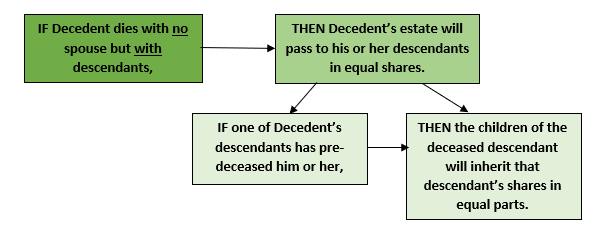What Happens If You Die Without a Will in Texas?
If you die without a will in Texas, your property will pass to your heirs-at-law via a process called “intestate succession.” This means that the heirs who survive you can receive your property after all of your debts are paid.
Texas Will Receive Your Property
The state of Texas will receive your real property (land) and personal property (anything that is not real property) according to the rules laid out in Chapter 201 of the Texas Estates Code.
The most important aspects of these rules are:
- If the deceased person (Decedent) has a spouse at the time of death, that person’s property will pass to the spouse;
- If the Decedent does not have a spouse at the time of death, that person’s property will pass in undivided shares to the Decedent’s living heirs;
- The Decedent’s heirs will inherit property as co-tenants, which, in its simplest terms, means the heirs will share the property they inherit. This can create challenges if one heir wants to sell the property but another heir refuses to sell, e.g.
Which heirs receive what depends on the facts of the situation. It’s easier to explain the complex “if/then” intestacy laws with a series of visual aids:
Scenario One: The Person Dies with a Spouse

Scenario Two: The Person Dies with No Spouse and No Descendants

If the Decedent has only one living parent and no descendants, the Decedent’s estate will pass one-half to the living parent and one-half to the Decedent’s siblings or siblings’ descendants. All property that passes to the siblings or siblings’ descendants will be divided equally among them.
If the Decedent has only one living parent, no descendants, and no siblings or siblings’ descendants, the Decedent’s property will pass entirely to the living parent.
Scenario Three: The Person Dies with No Spouse but with Descendants
For example, Susie dies without a spouse. Susie had two adult children, John and Jane, but her adult daughter, Jane, died five years before Susie’s death. Jane had three children at the time of her death, Kevin, Kendra, and Kyle. All three of Jane’s children were living at the time of Susie’s death.
Susie’s estate will pass in the following manner: John will receive ½ of Susie’s estate, and Jane’s three children will share equally the other ½ of Susie’s estate. In other words, Kevin receives 1/3 of ½, which is 1/6; Kendra receives 1/6, and Kyle receives 1/6. If the estate is worth $24 million, John receives $12 million; Kevin receives $4 million; Kendra receives $4 million, and Kyle receives $4 million.
In Texas, any Decedent must survive the Decedent by 120 hours, or 5 days, in order to inherit property.
What If There Are No Surviving Descendants Or Parents?
The rules of intestate succession become more complicated if no descendants and no parents survive. Further, the rules change when dealing with a Decedent’s separate estate versus his or her community property. Finally, if no descendant can be found, then the Decedent’s property will escheat to the State of Texas, meaning the State will step in and act as the beneficiary to the estate.
If there is a question as to whether or not a Decedent left an heir, the courts can order an heirship proceeding, which can become time-consuming and expensive.
Because of the complexity of intestate succession, and because most financial institutions will require some sort of proof that you are the rightful owner of a Decedent’s property, it is advisable to draft a Last Will and Testament. This will give your heirs-at-law peace of mind and help them avoid any complications and unnecessary costs after your passing.
Note: the statutory references in this post are current through the 85th Legislative Session, 2017.
DISCLAIMER: The foregoing information is not legal advice. It is general in nature and not applicable to all situations. The reader should not rely on these general statements and should consult with knowledgeable persons before taking any actions.
Need to plan your estate or have questions about it? Reach out to our estate planning lawyers in Austin at The Jones Law Firm PC via online form or call (512) 394-4289 for a free consultation.

